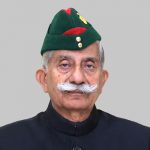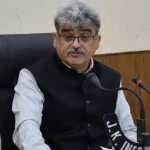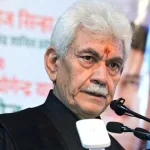Srinagar, Jan 23: The Tourism Trade Fraternity held a press conference at Hotel Shahenshah Palace in Srinagar on Thursday, bringing together key stakeholders to discuss the current state of the tourism industry in Kashmir.
The event was attended by prominent stakeholders, including Rauf A. Tramboo, President of the Travel Agents Association of Kashmir (TAAK); Gowhar Maqbool, President of Kashmir Hotel and Restaurant Owners Federation (KHAROF); Manzoor Pakhtoon, Chairman of the J&K Houseboat Association; Zahoor Ahmad Karnai, Chairman, Tourist Trade Interest Guild (TTIG); Sameer Ahmmad Baktoo, Chairman, Travel Agents Association of India (TAAI), J&K Chapter; and Nasir Shah, Chairman of the Indian Association of Tour Operators (IATO), Kashmir Chapter; among others.
During the press conference, the stakeholders reflected on the challenges and opportunities within the tourism sector. Nasir Shah, Chairman, Indian Association of Tour Operators (IATO), Kashmir Chapter, said, “Tourism has definitely increased, especially after Prime Minister Modi’s repeated mentions of Kashmir in his ‘Mann Ki Baat’ program. However, he pointed out that the positive outcomes from local promotions and trade fairs have been undermined by the slow progress of the Tourism Department, leaving the industry to grapple with significant challenges.
“While the tourism sector has performed better than other sectors in the post-COVID landscape, it currently faces dilution due to an oversupply of accommodations,” Shah stated. He highlighted that the bed capacity of hotels in Kashmir has risen dramatically from 50,000 to nearly 1 lakh in just five years. Additionally, he pointed out that the homestay sector now contributes approximately 60,000 rooms to the valley’s overall capacity. Despite this surge, budget tourism is struggling due to market oversaturation , and Shah urged the government to prioritize targeted tourism promotion initiatives to tackle these challenges effectively.
“There is a visible growth in tourism, but the benefits are not yet being felt on the ground. We need strategic promotion and better planning to translate this growth into real advantages for local businesses and communities,” he said.
Shah also raised concerns about the underutilization of the allocated tourism budget, stating that while Rs 60 crore has been earmarked for promotional activities, only a fraction of it has actually been spent. He called on Chief Minister Omar Abdullah to appoint an advisor with expertise in tourism to facilitate communication between the government and industry stakeholders, citing the current limited connectivity with the CM as a barrier to addressing crucial issues.
Manzoor Pakhtoon, Chairman J&K Houseboat Association, raised concerns over the declining houseboat sector. “We used to have around 2,000 houseboats, but now we are down to about 800. If this decline continues, it would deal a severe blow to the tourism industry,” he said.
Pakhtoon also highlighted the lack of a streamlined process for license renewals and called for the implementation of a Single Window System to ease the process for operators. He also praised the launch of the direct train service to Kashmir but suggested that it could be even more beneficial if it were a non-stop service from Delhi to Srinagar. “The train should be direct from Delhi to Srinagar, which would eliminate unnecessary stops and make travel smoother for tourists,” he added.
Gowhar Maqbool, President of the Kashmir Hotel and Restaurant Owners Federation (KHAROF), underscored the lack of coordinated efforts in planning and infrastructure development. “Kashmir is a God-gifted destination, but we are tapping barely 10% of its potential,” Maqbool said. He proposed the establishment of a dedicated tourism board comprising stakeholders and government representatives to address the sector’s challenges holistically.
Zahoor Ahmad Karnai, Chairman of the Tourist Trade Interest Guild (TTIG), pointed out the decline in foreign tourists, attributing it to poor infrastructure. He urged the Tourism Department to prioritize foreign tourists and take steps to promote Kashmir at an international level. “Foreign visitors are often disappointed by the lack of infrastructure,” Karnai said, calling for a greater focus on global tourism promotion.
Rauf A Tramboo, President of the Travel Agents Association of Kashmir (TAAK), highlighted the importance of recent infrastructural developments such as the Z-Morh tunnel, which has made Sonamarg accessible year-round. However, he expressed disappointment over the slow pace of development at other tourist destinations across J&K. “The development of these destinations has been at a snail’s pace,” Tramboo stated, urging the central government to allocate a tourism package to support the sector’s growth.
Sameer Ahmad Baktoo, Chairman of the Travel Agents Association of India (TAAI), J&K Chapter, stated, “There exists a disconnect between the government and stakeholders, and bridging this gap requires the appointment of an advisor by the government.”
He also pointed out, “While every state in India has a tourism board, Kashmir lacks one. We urge the government to establish a board to enable better planning and address challenges in the sector.”
As the press conference concluded, the fraternity expressed optimism that their concerns would be addressed under the newly elected government, paving the way for Kashmir to fully realize its tourism potential.








